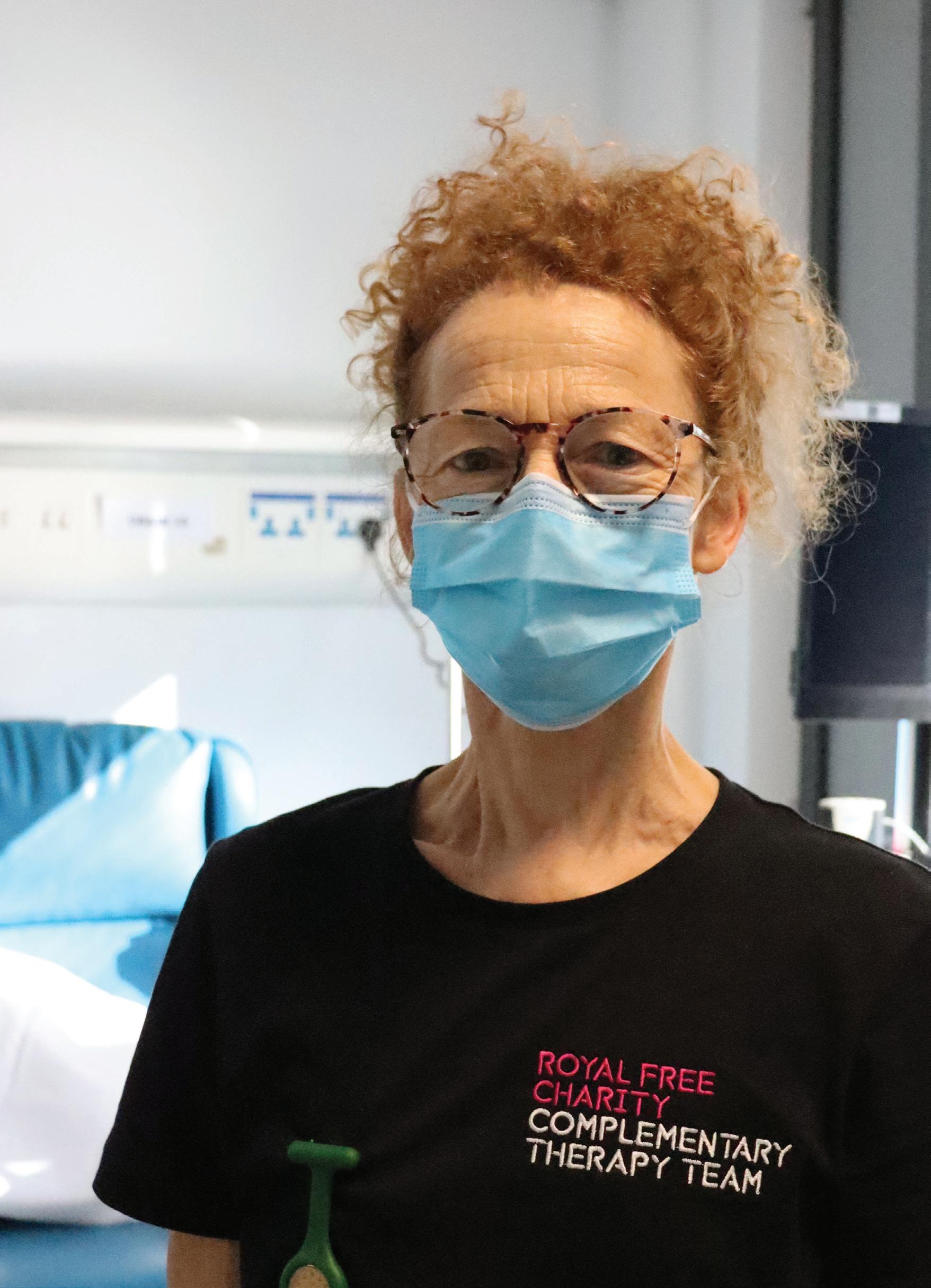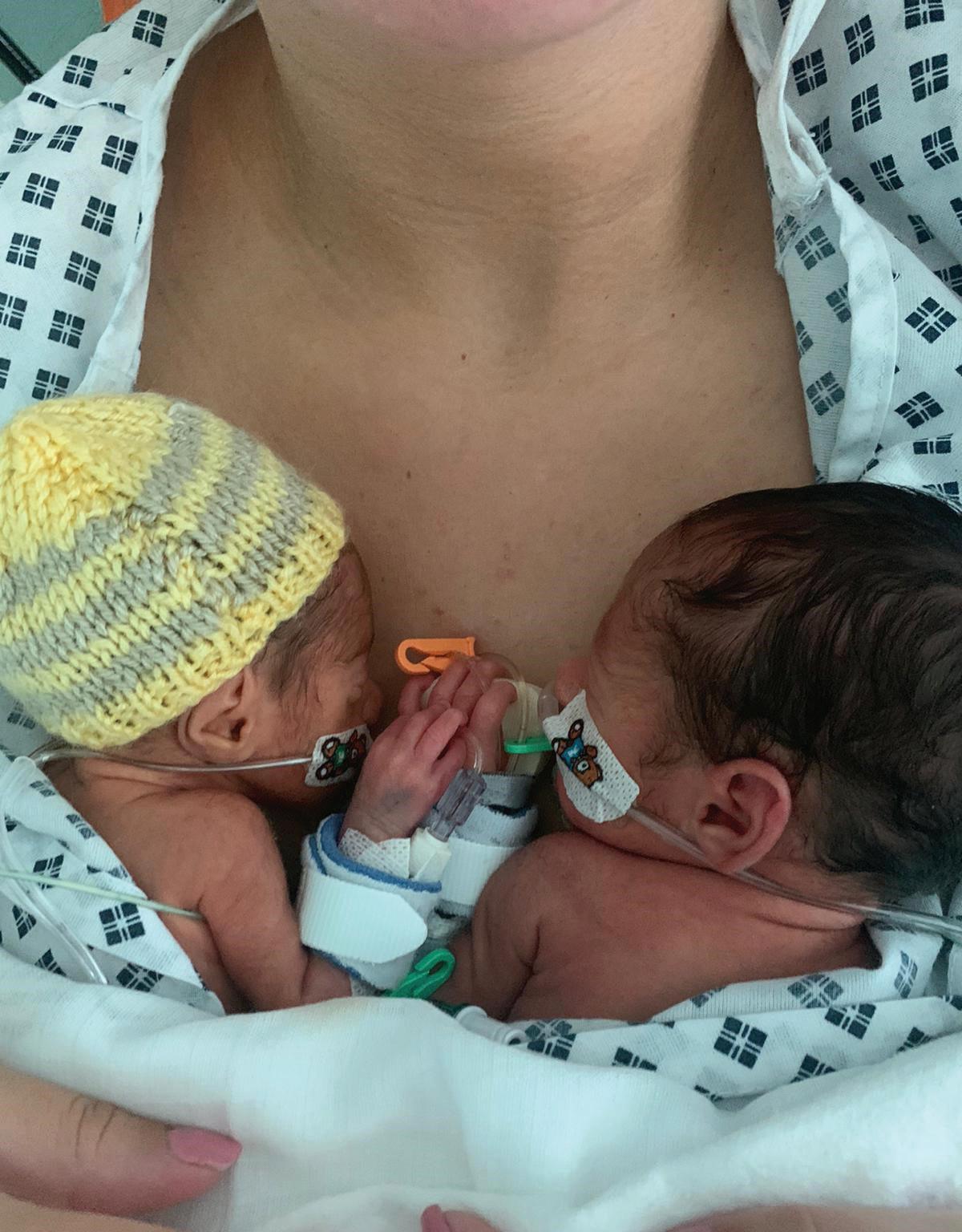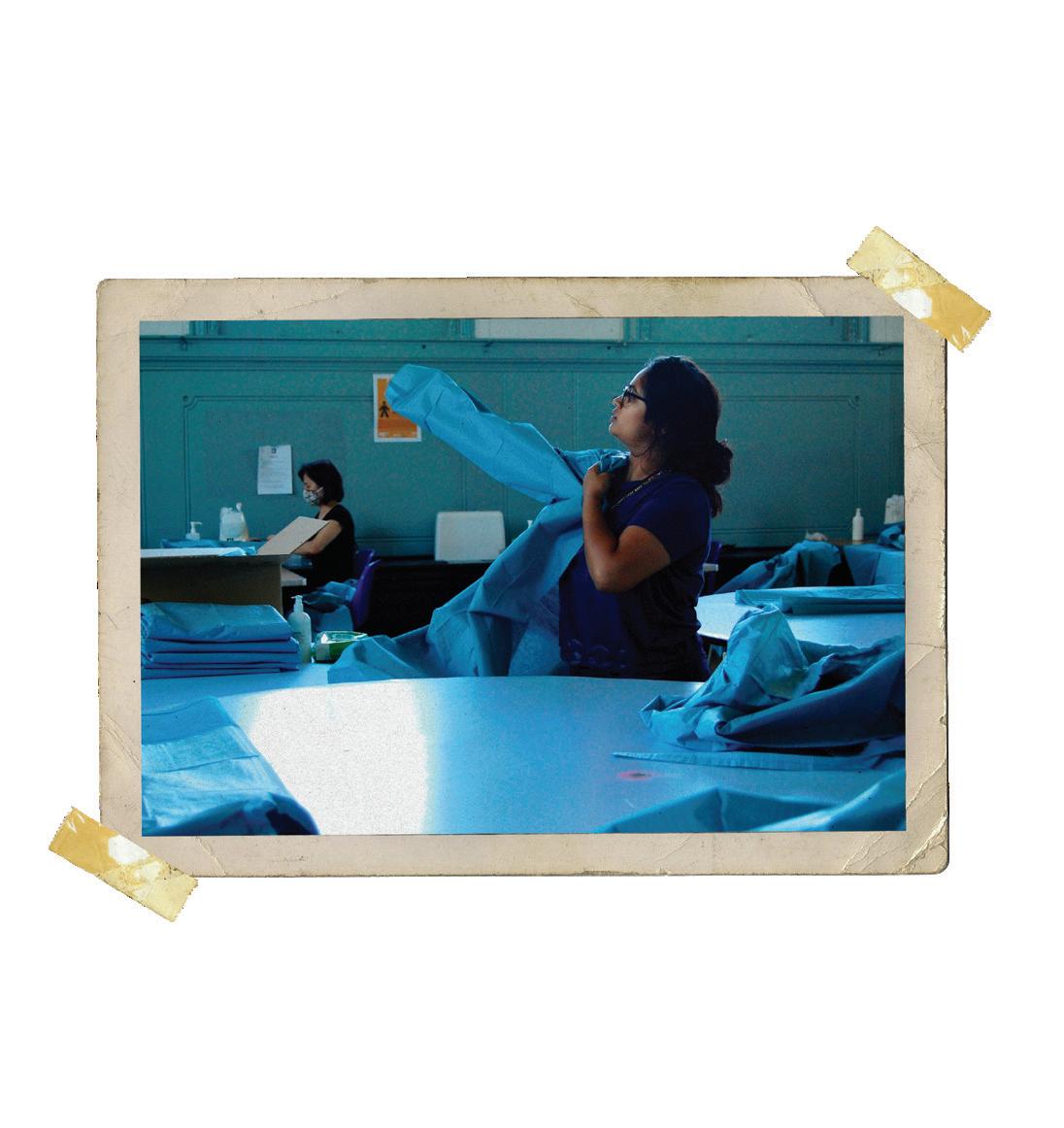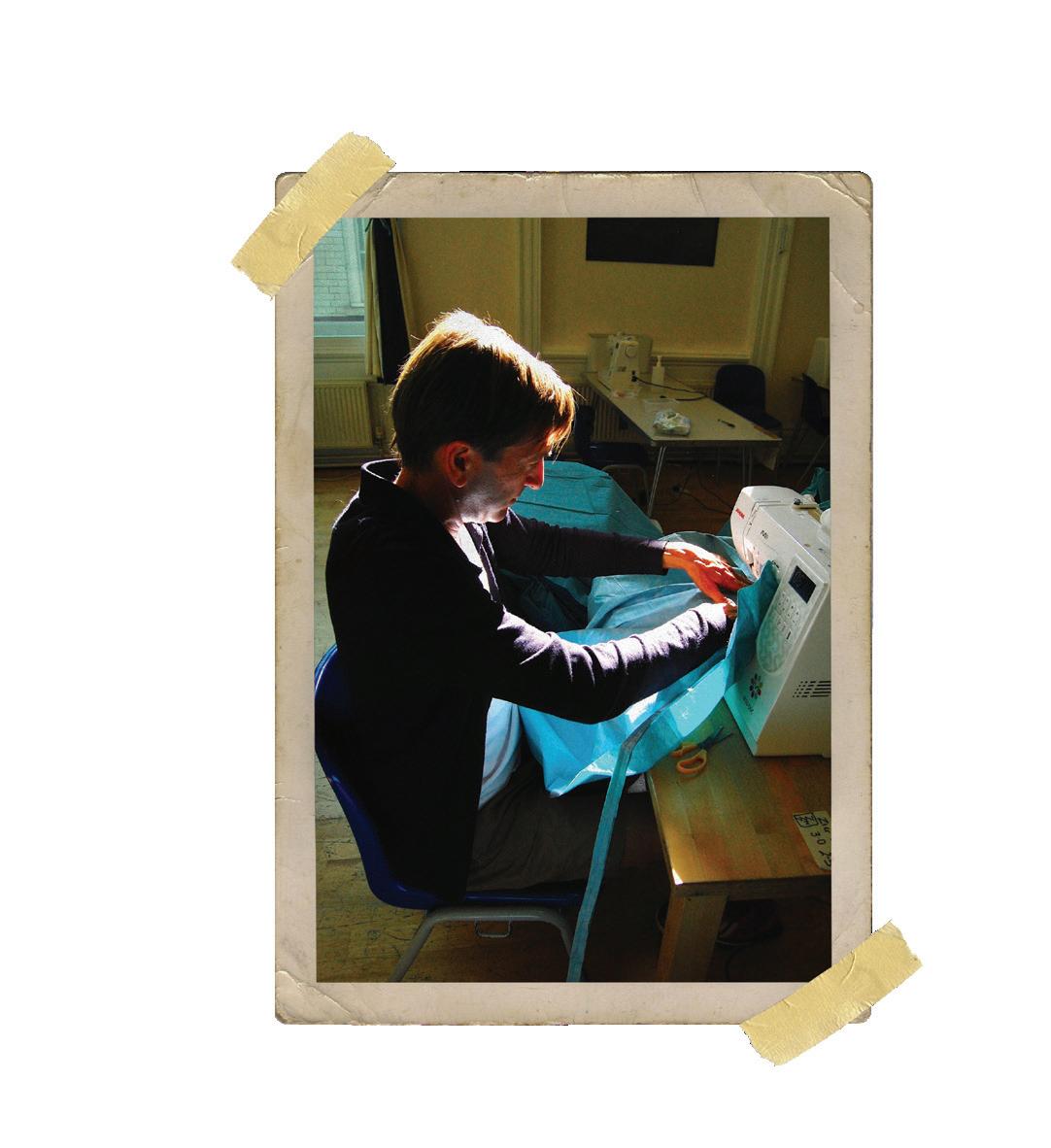
Simulation training
Sight loss support group
Massage for patients
Fundraising heroes
Volunteers are an important part of the team at the Royal Free London NHS Foundation Trust, supporting staff and complementing patient care. There are a host of volunteering roles – here’s just a handful.
Dementia companion
A special-trained volunteer whose companionship, conversation and activities make a big difference to the experience of patients with dementia. Many patients with dementia like to chat and reminisce with their volunteer companion or take part in activities that help maintain their cognitive abilities.
Digital volunteer
A new role created during the pandemic to address concerns that the move to telephone and video appointments might be hard for some patients to adapt to. Volunteers help patients in the sleep and ventilation clinics to remotely attend their appointments, explaining how to use the appropriate digital platforms.
Hospital radio
Royal Free Radio is on the air 24 hours a day, seven days a week, broadcasting to patients at the Royal Free, Chase Farm and North Middlesex hospitals. Delivered by volunteers for over 50 years, the radio station even continued to broadcast to patient bedsides throughout the pandemic.
Meet and Greet
Volunteers are based by the main entrances to the hospitals and help to ease the pressure of the reception desks by answering queries that patients and visitors might have. They get to know the hospital layout very well and can direct or accompany people to their destination. Arriving at hospital can be overwhelming and these volunteers help to make the experience as stress free as possible.
Pet therapy
Lower blood pressure, increased feel-good hormones and reduced stress are just some of the benefits of spending time with therapy dogs. The Royal Free canine volunteers are a bit hit with staff and patients alike. Before becoming a therapy dog, they must have a suitability assessment to make sure they have the right temperament - and their owners have to undertake a training programme!
Published by Royal Free Charity, The Pears Building, Pond Street, London NW3 2PP
Charity number 1165672
Company limited by guarantee number 09987907
www.royalfreecharity.org info@royalfreecharity.org 020 7472 6677
mum from north London is raising money to thank the ward that cared for her three children who were all born prematurely and needed specialist care.
Layla wants to purchase a fingerprint entry system which would mean that nurses at Barnet Hospital’s Starlight neonatal intensive care unit won’t have to stop work to give parents access to the ward.
Layla’s twins Amelia and Lily were born prematurely at 31 weeks and spent three months and eight weeks respectively on the Starlight unit. Just 10 months later, Ella-Mai was also born prematurely at 31 weeks and was cared for by the Starlight team.
“There were times during the twins’ stay where we truly never knew if we would be going home with both babies - it was a whirlwind of ups and downs. All three of our daughters faced medical obstacles most don’t in a lifetime,” Layla explained.
“Without the Starlight team and their dedication to our daughters’ care, I don’t know where we would be. They stood by our side, taught us how to be parents to premature babies and nurtured them to safety.”
Layla organised a Mother’s Day sponsored walk with the aim of raising £8,500 to pay for a fingerprint entry system for the ward. Access to the ward is strictly restricted to staff and parents or carers; a call bell system is currently used which means visitors must wait for a member of nursing staff to allow them entry. The new entry system will free up the nurses’ time to care for the babies while keeping the ward secure and avoiding the need for parents to wait outside.
You can keep up to date with Layla’s journey on Instagram @thestoryoftwins



ife does not end because you have sight loss. In time you’ll find your new normal.” That’s the message to anyone learning to live with sight loss from the founder of a support group for people with visual impairment.
Suzie Simons set up the Eye Matter support group with grant funding from the Royal Free Charity when she realised that there were few opportunities for people with visual impairments to meet and share their experiences.
“There simply wasn’t enough within our community that gave us the chance to support each other,” Suzie explains.
“Everybody’s experience of sight loss is different but what we all have in common is that living with sight loss is really hard. When it happened to me, I couldn’t use my phone or butter a slice of toast – it was a world of frustration.
“Our group can’t give people all the answers, but we talk about what works for us individually. We can pool our knowledge and share our experiences.”
Suzie’s story
uzie has multiple sclerosis (MS), a neurological condition where the immune system, which normally protects the body by fighting off infection, attacks the nerves by mistake. One morning, 16 years ago, she woke to find her vision obscured and from that day on, she has lived with sight loss. A period of hospitalisation led to a diagnosis of optic neuritis, or inflammation of the optic nerve. The effect that optic neuritis can have varies, ranging from blurred vision to a complete loss of sight. While most people with optic neuritis can regain their sight with treatment, Suzie has experienced optic atrophy, where her optic nerve is, for now, irreversibly damaged.
Following her sight loss, Suzie trained in counselling in the community, life coaching and facilitation. She also
Eye Matter started off as a monthly group meeting in person, giving members the chance to share practical advice and information coupled with the opportunity to learn from other people’s experiences. Following the onset of the COVID-19 pandemic, members began meeting virtually.
“Whether you were born with visual impairment, or however you get there, it can be very difficult to live with. Eye Matter helps our members to learn to live with sight loss, to accept that this is not the end. You may lose faith in yourself but with support, you can build yourself up to the point where nothing is out of bounds because life is there to be lived.”
In a recent survey of 38 group members, 100% said the support they received from Eye Matter has made them feel less isolated and more connected to others this past year. All survey respondents said the group had improved their wellbeing.
volunteered for the RNIB for almost 10 years, working in the Judd Street resource centre, and on its ‘Living Well With Sight Loss’ programme as well as campaigning and fundraising. She is very grateful for all the support offered to her by the RNIB and the Royal Free Charity to help build the Eye Matter community.
Accolades
uzie’s support for patients experiencing sight loss led to a volunteer of the year award for the Royal Free London NHS Foundation Trust annual awards. She was shortlisted for the Jewish Volunteering Network’s outstanding achievement award and has recently been shortlisted for the RNIB’s See Differently awards in the volunteer of the year category.
sing console game technology to refine the motor skills needed for surgery and medical procedures is just one of the ways the Royal Free London NHS Foundation Trust supports the development of its medical staff.
In the trust’s pioneering simulation centre, which the Royal Free Charity helped to set up, trainee doctors practise shooting basketballs and popping balloons in virtual reality simulation training. This helps them develop the psychomotor skills they’ll need to perform medical procedures.
Once they’ve mastered the entry-level computer games, they move on to anatomically-accurate simulations of a wide variety of clinical scenarios.
Dr Pasquale Berlingieri, head of virtual reality training, explains: “Simulation is about learning and practising clinical skills in a safe environment.
“When our doctors train here, thanks to the application of screen-based technologies, it gives us the assurance that they’re developing high levels of professional standards within their area of expertise.”
The simulation centre, based at the Royal Free Hospital, has a seminar room, a simulation room, and a debriefing room as well as individual rooms for endoscopy, laparoscopy and interventional radiology simulators. A huge bonus is that it is accessible round the clock for doctors and students.


Case study
Dr Laura White started her gastroenterology rotation in 2021 and makes regular use of the endoscopy simulator training programme.
“Low dose, high frequency – that’s the mantra of the simulation centre,” explains Dr White. “It’s better to do short sessions twice daily rather than to do longer sessions less frequently. Having this facility here on site means I can train consistently and fit in sessions at the start or end of a shift, or I can come here in my own time. Regular training means I’m constantly developing and improving my motor skills and my muscle memory.
“Having this facility has greatly speeded up the process of learning endoscopy skills. The simulators can replicate a patient’s response, including the sounds they make during the procedures. The more practice you get in simulation
training, the more prepared you are for the reality of performing an endoscopic procedure.”
Once the training session is completed, a performance report highlights what went well, what needs further attention and it even if the “patient” was in pain or discomfort.
Endoscopy fact file
An endoscopy is a test which involves looking inside your body using a long, thin, flexible tube with a light and camera at one end. Images are shown on a television screen.
Endoscopes can be used to view the gut via the mouth and throat or the rectum and are also used for gynaecological investigations. An endoscopy can:
investigate unusual symptoms
help perform certain types of surgery
remove a small sample of tissue, a
biopsy, to be looked at more closely.
How charity support led to the founding of the simulation centre
hen it opened in 2010, the centre was the UK’s first open access screen-based simulation training facility for junior doctors and medical students. It was made possible with the support of the Royal Free Charity, thanks to a twoyear pump-priming grant allowing the
purchase of two specialist simulators and funding two job roles. Today, the centre generates income from its highly-specialist training programmes available to health professional in London and further afield.

att Black, who lives in Hampstead, fell ill in April 2020. His GP initially thought his condition was COVID-19 but when his symptoms worsened dramatically, a scan at the Royal Free Hospital’s A&E department showed a large growth in his bowel.
Matt explains: “The next day I was wheeled into the operating theatre for what we thought was probably an hour or so. I was in theatre for five and a half hours under the brilliant care of Colin Hart and his team - the net result was they found a six by nine cancerous tumour in my bowel, removed that and two thirds of my colon.
“There is no question that the actions of the doctors and surgeons saved my life. I had a tumour that was growing out of control. It had been there for years. I didn’t know about it; it could’ve burst, it could’ve grown and blocked me - but the brilliance of that surgical team saved my life.”
COVID-19 disrupted all aspects of health care. Matt is one of many people whose cancer was diagnosed following attendance at an emergency department. Between 2020, a record number of cancer diagnoses were made in the UK as a result of an emergency hospital admission.
Matt spent nearly two weeks in the Royal Free Hospital recovering from surgery. Between April and May 2020, his weight had dropped drastically from 82kg to 63kg. He recalls looking skeletal when he was finally discharged from hospital and unable to walk unaided.
Two years later, Matt is back to good health and feels lucky to be alive. “I’m back to work, I’ve put the weight back on and I exercise every day. I have this phenomenal follow up; every three months I’m back in the clinic to check my bloods and my system. It’s not just the care from when I was there, it’s the aftercare: all of it is ensuring that I’m here for years to come. That’s what I will always be grateful for.”
Raising money to say thank you
fter his lifesaving surgery, Matt wanted to support the staff at the Royal Free London NHS Foundation Trust. He signed up as a charity champion for the Royal Free Charity’s Breaking Point fundraising appeal. The appeal addressed the impact of the pandemic on RFL staff, patients who are waiting for their treatment and those struggling with long COVID. Matt was one of 300 champions who rallied support for the campaign to raise more than £500,000 in just three days. Matt and his family raised £30,000 - a phenomenal amount that will help the charity to make a really big difference.
“We wanted to do something to help the amazing staff, all of whom are working in what has been described as war-like conditions. Matt saw at first hand the incredible pressure the teams were under during the pandemic. By supporting Breaking Point, we wanted to help the Royal Free Charity provide dedicated areas for the frontline staff to have respite time and recharge in between shifts.”
The Black family

How the Breaking Point appeal will help:
Virtual reality therapy sessions for staff to combat the effects of anxiety and stress
Research into long COVID to see if a simple blood test could identify the risk of a person developing it
A digital pilot project to speed up pre-operative assessments and get patients their surgery faster
Rest spaces to give staff quiet places for respite during intense shifts on busy wards
inchley Memorial Hospital’s infusion suite offers cancer patients chemotherapy infusions and supportive treatments in a purpose-designed unit.
The Royal Free Charity’s complementary therapy team offers additional support to patients receiving cancer services at the community hospital.
Fiona joined the complementary therapy team as a massage therapist in 2011 and has worked across all of the Royal Free NHS Foundation Trust’s hospitals.
The team has recently increased its support for the infusion suite from three hours a week of massage therapy to five days a week for both patients and staff.
Fiona and two other therapists offer leg, foot, shoulder, and hand massages which help with cannulation and relieve stress and anxiety.
Fiona helps patients to feel calm in a busy unit, as well as offering a listening ear for patients who like to chat.
Fiona loves working in such a caring and friendly environment: “The patients and all the staff are absolutely fabulous. Everyone tells me the unit has a calm and lovely feel.”


ailesh fell ill with COVID in April 2020 and spent a total of 40 days in the Royal Free Hospital. He’s grateful to all the staff there for saving his life, whether it’s the doctors and nurses who treated him or all the staff that keep the hospitals running behind the scenes. He had also been a patient due to a spinal injury ten years ago.
Now, he volunteers 50 hours a month between Finchley Memorial Hospital and the Royal Free Hospital, greeting patients and helping them to find the way to their appointment.
Sailesh explained: “I wanted to give back some of my time to the hospitals after everything they had given me. I enjoy volunteering as it helps me forget about my own illness and brings me joy to help others. Finchley Memorial is a busy hospital and helping direct patients and visitors can ease the stress on both patients and hospital staff.”





